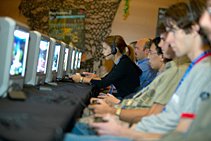3/06/2006
Games can be teaching tools, author says

Diana ThorpMARCH 07, 2006
VIDEO games are teaching children skills to take them into the 21st century and should be welcomed as an educational tool, according to US learning expert Marc Prensky.
School's in: Marc Prensky says game players can learn skills such as teamworkTeamwork and powers of deduction are valuable skills that students can learn from games.
Concern about children and video games comes mostly from people who have never played the games and don't understand them, Prensky says.
The critics are disrespectful of the work children do in learning the games, he says.
Anything an adult might object to is probably a small part of the game, he says.
"It's an opportunity for you as a parent, or as a teacher - as an adult - to engage your kid in an important discussion, such as: hitting someone over the head with a baseball bat in a game doesn't mean you should do it in life," Prensky says.
Adults should engage children in conversation and not just ban the games, an act likely to anger the children and give them the message that they're not respected, he says.
"What's happening, especially in education and to some extent families, is that the teachers disrespect the kids, they say: this is wasting your mind and ruining your life.
"Then the kids turn around and disrespect the teachers and tell them they're technologically illiterate, and their opinions are useless.
"It's setting up a horrible cycle, a very destructive cycle and the only way we can get around that, I think, is to have mutual respect."
Children benefit from video games in many ways, including learning to work effectively with others, he says.
"They learn to make good decisions under stress, they learn new skills, they learn to take prudent risks, they learn scientific deduction, they learn to persist to solve difficult problems, dealing with large amounts of data, they learn to make ethical and moral decisions and to even manage, in many games, businesses and other people," Prensky says.
"This stuff needs to be tempered by other messages," he says.
"If a kid spent all his time playing only violent games and killing people, and nobody ever asked why they were doing that, or said killing is not right, that would be a problem. We live in an age where there are counter-messages, so it's important to make sure the kids get those messages."
Prensky is concerned about people moving quickly to ban things, such as mobile phones, in schools.
"Instead of figuring out how we can use this stuff and where it's good and where it's not good and how we can take advantage of this great technology that the kids have in their pockets, we say it's bad and it should be banned," he says.
Prensky's latest book Don't Bother Me, Mom - I'm Learning: How Computer and Video Games are Preparing Your Kids for 21st Century Success will be launched soon.
He was in Adelaide at education.au's first 2006 national Transforming Learning Through ICT seminars last week.
The Australian